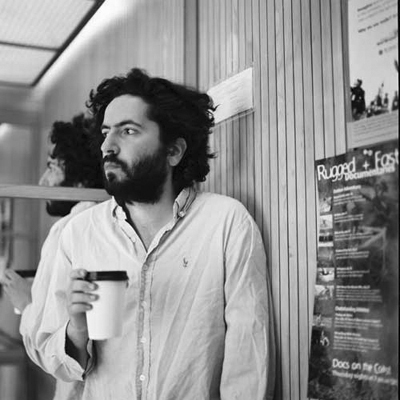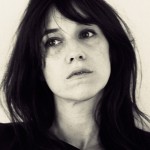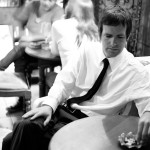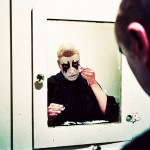Words by Michael Tedder
Perhaps the only thing more shocking than the quality of Dan Bejar’s melodically nimble songwriting is how many of his songs there are to be shocked by. Not only does his main project, Destroyer, dependably release an album every two years, but he also keeps himself busy with side projects including Swan Lake (which features members of Frog Eyes and Wolf Parade) and Hello, Blue Roses (a collaboration with his girlfriend, Sydney Vermont). And then there’s that New Pornographers band. At this rate, even fellow Merge artist Bob Pollard is starting to look like a slacker. Bejar, who splits his time living in Spain and Vancouver, spoke with self-titled about his new album, Trouble In Dreams, and why he’s done with the harmonica.
self-titled: What was your main idea coming into Trouble In Dreams?
There was a scary lack of ideas coming into the record.
Really?
Yeah, I didn’t have any of them. I always have, like, an idea at first. And then it gets trashed. I always want to record live, and I ditch the idea. I get cold feet when it gets close to the studio. This time, I didn’t even need to get close to the studio to ditch the idea. The songs, in a performative way, weren’t really coming together. They all had really awesome parts, but as a band, it just kinda sounded like a bunch of noise, sometimes. So I kind of just decided to make a bit more of a studio record. That’s never really my intention, but that’s what happens. I kind of wanted to make things dreamier sounding then they had been of late.
It’s definitely dreamy, so you certainly accomplished that.
Well, the piano player [Ted Bois] couldn’t play. He couldn’t really find a point of entry as a keyboard player in practice, and then he took it upon himself to hole up in his apartment with some headphones on and create all these string and synth arrangements for the songs. That stuff I didn’t even see coming. I didn’t even know it was going to happen until we got into the studio. A lot of the songs I just had no idea they were going to be so symphonic, at least half of them. And then the other half I just wanted to come off like thrashy rock songs.
Between your own stuff and the various side things you do, it seems odd that you would ever be at a loss for ideas.
I mean, there’s always stuff to throw down, but as far as having some kind of a rigorous, overarching concept…I don’t always have that. I don’t particularly like those kinds of records. Sometimes I do. Musically, writing-wise, I have pretty specific ways of doing things, but I’ve always been very scattered, basically, and really based on collaborations and what other people bring to the table.
What are your specific ways? Is it hard to describe?
It’s hard to describe because, I don’t know, it just comes out, and then it’s just there. But it’s getting to the point where it’s like, “This really sounds like a Destroyer song,” you know? I don’t even think about it, and I don’t know if what I do is good or not, but I am starting to become conscious of the fact that at least it has a little distinct hole to call its own compared to the other things that are out there. That’s something I don’t really strive for, and I don’t think you can. It’s just something I call my style.
This record is intricate yet lively. How much do you plan out, and how much is done in the moment?
Well, there was some work that went into making this record. I kinda feel like it was the hardest record I’ve done.
Really?
Yeah, it was the one that came least easy–let’s put it that way–partly because I didn’t know what a proper version of the song was supposed to be. You know when you don’t have any idea of what something is supposed to sound like? You just kind of work it and work it until all of a sudden the veil is lifted, and you’re like, “Behold, this is your song.” It’s more moments like that instead of just wanting to capture, say, a performance. Rubies [Destroyer’s 2006 album], I would say for the bulk of those songs, the best renditions of them took place in the practice space. Like we could be five guys in a room who really laid into those songs, and it would sound really good. And so, the challenge was just to document that. And with this record, there were three or four examples of that, but the rest of it had nothing to do with trying to capture a performance. It was more just trying to create something as you go on tape.
So in that sense there’s a lot of musical ideas flying fast and fancy free, people just throwing stuff down to see what sticks. The guitar player [Nicolas Bragg] and the keyboard player [Bois] both have a really natural and strong sense of melody, and they could cough that shit up without really blinking an eye, really easy, so there’s always tons of musical strands to chose from, and I’m OK. I can come up with stuff once in a while. Our drummer [Fisher Rose] fills lots of space, and he loves to get other instruments in his hand and make weird sounds.
For a couple of years now, I’ve had the idea of doing the song “Shooting Rockets” as a building, orchestral number. It’s a kind of longer song in the middle of the album. That one I always wanted to approach with a certain sense of rigor. Every thing else was just kind of flying by the seat of our pants. Is that an expression?
I think so, yeah. Not sure where it comes from.
I’m sure it is, though.
“Shooting Rockets” is probably my favorite track on the album.
That’s weird. People keep saying that stuff. I find it very…unlistenable.
Really?
I just think it’s really harsh. I understand [why people like it]. It’s really melodious and has a dramatic ebb and flow to it, but even the people who play on it are like, “Man, this song is such a dirge; it’s such a drag.” I don’t know. I’ll try listening to it again. I mean, I think it’s cool; I think it’s good…but it’s not the style of singing or writing where I really see myself too reflected, and it’s not a song I could ever imagine singing again.
You don’t think you’ll do it live?
With a ten-foot pole, I won’t sing that song.
But people keep telling you it’s their favorite?
It keeps coming up. I don’t know if people say it’s their favorite, but they seem to really like it. I thought it would be a song that would get the skip button a lot. It’s kinda long, and until the very end when things kind of explode, it is a little wandering and aimless. There’s not a lot of light in the song, even though there’s a lot of dancing string parts and action-movie guitar parts. Maybe there’s just lots of stuff going on that keeps people interested.
It’s interesting that you mention light because on that song you sing, “We live in darkness / Light is a dream.”
Oh, “Live in darkness / The light is a dream.” Right.
Then later you say, “The first sunrise / You see the light holds a terrible secret.” Why was this something you kept coming back to on the record?
I don’t know. I never thought of that.
It wasn’t a conscious decision?
No, it was just like a preoccupation that kept popping up in the writing. I don’t really analyze the stuff, and I sure don’t analyze it even as remotely as close to it as I am right now. There is something about trying to see, though. That seems like a classic poetic concern. I think there’s, for the first time, kind of classic surrealist-style writing, simple, dream-like situations described in the songs.
I definitely noticed that.
I never really tried to nail that in the past.
Really?
I don’t think so.
It seemed to be there before with some of your stuff.
I’ve done descriptive writing. When I first started writing songs I kind of had a political mandate, which was to reject that kind of writing. I thought that was the only course to take because it seemed to be so explored, a milked songwriter territory. Like, stay away, from Bob Dylan style or this world of the surreal. So I thought that I would write without using any kind of adjectives. I [have] since ditched that, obviously, and I’ve come to my senses because it seems to be the kind of writing that comes most natural to me, which is probably a good reason to reject it. At least at first, when you start. And then you have to throw up your hands and do what it is you do. But it’s always been really busy, and it’s kind of something I’ve been trying to get away from a little, these over-amped words. On this record I really wanted to pare things down and just try to really nail it, instead of having the melodies be so dancey and darting around all the time.
When you’re writing a song, do you write from who you are as a person, or is it kind of creating a little story and there’s a character expressing each point?
I have no interest in characters and stories, and I don’t have any interest in myself. I don’t try to create something that has a meaning, and I don’t really understand what people even mean when they say that. It’s hard to take this kind of approach to words. I just see words as a function, and they either evoke something or they don’t, and you either nail it or you don’t nail it. I just try to nail it. And I try to keep the language as descriptive and as musical and as poetic as possible at all times and then try to do the same thing with the music and hope that at some point they become the same thing.
So it’s really more about evoking a feeling than a literal meaning?
Yeah, I don’t differentiate the two. You can just mix all those words up and rearrange them, and it would mean the same thing.
So a song like “My Favorite Year” isn’t so much about your actual memories about that year but the feelings you are trying to convey?
Yeah, I don’t know what 1993 meant to me, even though it’s mentioned in that song. All I know is that I was twenty years old and just like a lost, messed-up kid, like everyone else who was twenty years old.
What were you doing?
Dropping out of school. That song is not even about my favorite year. It just happens to be called that. It did seem to be made up of really specific memories, even though none of them are my own, but I think it can maybe come off that way, and I tried to write it that way. I think that’s actually one thing that seems to pop up on this record more than other ones, the act of looking back on things, even if it’s in a reverie state or a feverish state or something.
It seems to work for you not to analyze your music, and here I am asking you to do it.
I like analysis, but my version of the word is different. I like to analyze how something functions, and usually when people say analyze, it’s like an analysis, to try and find the code, and what I always try and say is that there’s no code. It’s just very literal poetic acts, one piled up on top of the other, and for some reason no one really buys that answer. If I have an ideology in art making, that’s probably it, you know? It’s not like riddles so much as it’s about mystery. If I could say it in some other way, I would, but the whole reason I’m saying it in that way is because that’s the only way you can.
It’s more about the mystery than solving the mystery?
Yeah, because there’s no solution. There’s just like, ideally something that you read or you hear something or you look at something and you just like fucking bask in it and in how great it is or how horrible it is or whatever.
So this is your eighth album as Destroyer…
Oh, fuck.
…how do you keep things fresh for yourself?
I try to change up the people that I work with as often as possible. I guess not so much this time because, except for Fisher playing drums, everyone else played on Rubies. But, you know, not be constricted to one style or any single idea or any single five ideas. Hopefully my writing style is still shifting and changing. That kind of keeps me interested. But I don’t have to stay interested. I just do it. I don’t have enough of a financial stake in this where I’m just going to keep churning shit out for the sake of keeping myself alive. I still get just sheer pleasure in the act of it. I mean, recording the records…it seems the more I know about it and the more I do, it seems more complicated and fucked up and untenable. I’m not sure why that is. It seems the more used to it I become, the more impossible it is to nail it, get it right. Or maybe that’s good. It always keeps me wanting to do it again, taking different stabs at things.
It prevents you from being too comfortable?
Yeah, I’ve never been comfortable. I’ve never walked onto a stage and felt comfortable, or waltz into a studio and felt like I owned the place. The studio’s a playground sometimes. It can be immense fun, but other times it’s totally stressful.
Your vocals on “Plaza Trinidad” are so theatrical. Is it difficult feeling comfortable doing that with your voice?
That one’s like an acting job. I’m not an actor, but I’m kind of interested in actors and the insane mind frame that they must be in. The lyrics tend to lend themselves to that kind of treatment, and for some reason the melody seemed to lend itself to that as well, just the kind of classic Destroyer…blown-out drunken ponce. I think I was drinking whiskey that day. Maybe that helps. Yeah, because a lot of it I wanted to be more restrained and natural. I just wanted to sing the words and the melody and just get that across and sidestep as much Destroyer bullshit as I could. The same with the last song, “Libby’s First Sunrise.” I just wanted to melodically read the song. But then other ones seemed to demand some kind of second or third character, and that’s one of them. “Libby’s First Sunrise” is probably one of my favorites. I liked the way that one turned out. I think it was close to being the one where it was like, “Well, this is kind of the idea that I had for the record,” and then you never actually get that idea down, but there’s usually one or two songs where you kind of get close, and I think that’s one of them, the elements that I wanted to start with.
It sounds like, looking into those lyrics, you could maybe read some social commentary into them.
Yeah, probably. All Destroyer songs are political songs, in one way or another. I certainly didn’t write it with the intention of commenting on anything social that I know of.

Speaking of vocals, there’s a lot of good wordless vocals on this album-la-las and ba-bas. How do you decide those vocal elements work in a song better than singing words?
I like chants. Actually, I don’t like chants, I like la-las and ba-bas. There’s a lot of that on Rubies and maybe on [2004’s] Your Blues a little bit. I actually didn’t want there to be any on this record. I was going to perform the melodies on the harmonica. The one idea that I had for this record was a lot of harmonica. But something happened, and now there’s not a single note of harmonica. I had the headpiece, and I bought all these harmonicas, and at the end I just didn’t get the gumption up to try to use it. But the ideal is for all the la-las and ba-bas to be performed on harmonicas. You know, I could probably play them on the trumpet as well, but I don’t know how to play any other instruments. I can play a little bit of piano, and you hear me play a bit of guitar, not much. So I thought I would just sing those parts because that’s mostly how I see myself, as a singer more than anything else. At this point, that’s most of what I do. I don’t see myself as able to craft songs in a traditional songwriter sense. I’m not like a shit-hot guitar player or musician really. I’m not like a Phil Spector or Brian Wilson or even Paul McCartney type, who can build pop symphonies. I just sing ’em. Ba-ba-ba is what I do.
You don’t think of yourself as a songwriter?
I guess I write songs, but writing songs when you make music only gets you so far. At some point, you have to make things emit sounds. A song you can just write it down on paper and it exists. It’s like about ten percent of the battle.
So we’re in New York right now, and one of my favorite songs of 2007 was “Myriad Harbour” on the New Pornographers’ Challengers album. You’ve written about New York before. “Jackie, Dressed in Cobras” mentioned it…
Oh, shit, you’re right. I forgot about that.
What is it about New York that inspired you to write?
Nothing, I’m really not inspired by New York at all.
Really?
Yep.
Hmm.
I could care less about it.
So where did that song come from?
“Myriad Harbour,” it happens to take place there. I got a call from Carl [Newman, of the New Pornographers] or an e-mail or something in November saying, “OK, come on, man. Where’s your songs?” because that’s business as usual. And he lives here now, so at that point, I was living in Spain. I thought everyone was going to congregate in New York to make this New Pornographers record. And I wrote a song about an experience that had happened, which was coming to New York. If he had gotten married to someone in Gainesville, Florida, and moved there and we all went to Gainesville, Florida, to make a New Pornographers record, maybe that would have been the backdrop to “Myriad Harbour.” But he didn’t. He moved here. I mean, the song has a bit of Cat Stevens, that “Oh, baby, baby. It’s a wild world,” like, “Be careful out there. The big city is going to chew you up and spit you out.”
When you are writing a song, do you know right away if it is a Destroyer song or a New Pornographers song?
I know right away because the New Pornographers these days…it was a bit blurry before because Carl had access to a pool of songs that I don’t even remember anymore, so he’d be like, “So what if we do this one, or what if we do that?” Now it’s more like I sit down and write specifically for that band. And that’s the only kind of conscious writing that I do. I don’t really sit down normally and write a song, for anything. But with the New Pornographers, I sit down and write a New Pornographers song. So yeah, it’s pretty clear cut these days.
And when you’re consciously doing it, you obviously get a different effect?
Yeah, I think so. I think the fact that I do it really consciously means I kind of want to work within genres a bit more, and I kind of try to write in a way that I think lends itself to really specific forms of rock music and pop songs. Destroyer stays a little more abstract.




